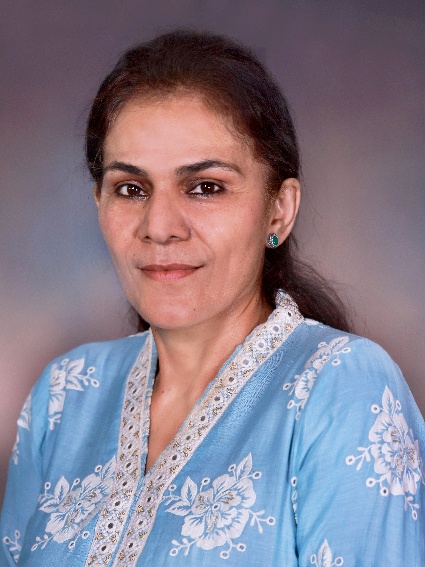Dr. Kaur has secured more than ₹20 crore in research funding through 30 competitive projects (14 as Principal Investigator and 16 and co-principal Investigator). She has authored >130 research papers. Her work has led to the release of 7 crop varieties, registration of 13 genetic stocks, and designation of 5 genes. She has guided 7 Ph.D. students and received several honors, including award for efficient use of Plant Genetic Resources (2023) by Indian Society of Plant Genetic Resources (ISPGR) and honorary fellowship of Punjab academy of sciencesProfessional Accomplishments
Education: B.Sc., Khalsa College for Women, Ludhiana (Medical); M.Sc., PAU, Ludhiana (Genetics); Ph.D., PAU, Ludhiana (Genetics)
Positions held: Principal Molecular Geneticist (2023-till date), Senior Molecular Geneticist (2020-2023), Molecular Geneticist (2008-2020), Research Associate (2001-2008)
Crops Working on: Wheat, Mungbean, Urdbean;
Research Interests:
- Pre-breeding in wheat: Transfer, mapping and cloning of economically important gene from wild progenitor and non-progenitor of wheat to cultivated wheats
- Host pathogen interaction: especially in wheat rusts
- Improvement of disease resistance in Mungbean and Urdbean
Research Projects (Ongoing):
| S.No | Name of the Project/Scheme | Period | Funding agency |
| 1 | Engineered evolution of key yield traits: seed size and rust resistance in wheat SPARC/2019-2020/P2549/SL | 2023-24 | SPARC, Indo Australia |
| 2 | Enriching the rust resistance of wheat by mapping the novel leaf rust and stripe rust resistance from multiple wild progenitor and non-progenitor species [BT/PR52232/BSA/33/29/2024] | 2024-27 | DBT |
| 3 | Molecular mapping and introgression of lesser grain borer (Rhyzopertha dominica) resistance from wild wheat Ae. tauschii derived synthetic wheat (SPG/2023/000577) | 2024-27 | SERB |
| 4 | Genome-wide introgression of tetraploid non-progenitor Aegilops peregrina (UUSS) in hexaploid wheat background and mapping of multiple disease resistance BT/PR43090/AGIII/103/1317/2021 | 2022-27 | DBT |
| 5 | Characterization and evaluation of wheat germplasm for biotic stress resistance BT/Ag/Network/Wheat/2019-20 | 2020-27 | DBT |
| 6 | CoE on Development and Integration of Advanced Genomic Technologies for Targeted Breeding. Subproject: Breeding high yielding quality wheats using nested populations and SNP-chip | 2022-27 | DBT |
Research Projects (Completed )
International projects
- DBT-BBSRC Project on A genomic assisted synthetic hexaploid wheat gene isolation and pre-breeding platform for improved heat tolerance and sustainable production. (2015-19) (PI)
- DST Indo-Australia Project on Mining for Heat Tolerance of Wheat in Australian and Indian environments (2015-18) (PI)
National projects
- DBT Project on Genome-wide introgression of tetraploid non-progenitor Aegilops peregrina (UUSS) in hexaploid wheat background and mapping of multiple disease resistance (2022-27) (PI)
- DBT Project on Characterization and evaluation of wheat germplasm for biotic stress resistance (2020-25) (PI)
- DBT Project on Pyramiding of Rust Resistance Genes into High Grain Quality Wheat Lines Developed Through Marker-assisted Selection (2018-21)(PI)
- ICAR-NASF Project on Exploiting alien genetic resources for developing climate resilient wheat and understanding mechanism of heat tolerance (2018-21) (PI)
- DBT-US Project on Identification and characterization of different pathotypes of yellow rust pathogen (Puccinia striiformis) with Foldscope (2018-19) (PI)
- DBT Project on Development of chromosomal segmental substitution lines for 5U chromosome of Ae. triuncialis for transfer and mapping of multiple disease resistance and grain softness in elite wheat background (2017-20) (PI)
- DBT Project on Improvement of end use quality of 1BL/1RS translocation containing wheat varieties by removing of Sec-1 loci and retaining Glu-B3 using marker assisted backcross breeding (2015-20) (PI)
- DBT Project on Whole genome sequence based SSR markers development in mungbean and their utilization in mapping of MYMV resistance in an interspecific cross (2015-18) (PI)
- UGC Project on Molecular mapping of leaf rust resistance gene derived from Aegilops tauschii and its transfer into elite wheat cultivars (2013-16) (PI)
- DBT Project on Genetic Enhancement of Minor Pulses: Characterization, Evaluation, Genetic enhancement and generation of genomic resources for accelerated utilization and improvement of minor pulses (2018-21) (Co-PI)
- DBT Project on Genetic Enhancement of Mungbean Through Interspecific Hybridization and Molecular Interventions (2013-16) (Co-PI)
Selected Research Publications :
- Kaur, A., Dhillon, G.S., Dhaliwal, S.K., Kaur, B., Garg, M., Chhuneja, P., Singh, K., Srivastava, P., Sharma, A. and Kaur S., (2025) Genomic dissection of terminal heat tolerance in synthetic hexaploid derived nested introgression libraries of wheat (Triticum aestivum L.). Functional and Integrative genomics 25:98 https://doi.org/10.1007/s10142-025-01604-2
- Bai, B.K., Kaur, B., Kaur, S., Kaur, J., Sharma, A., Sri, T., Chhunaja, P. and and Kaur, S. (2025) Unveiling Leaf Rust Resistance Introgressed from Non-Progenitor Wild Species Aegilops kotschyi into Hexaploid Wheat. Scientific Reports, Accepted
- Jan, F., Parthiban M , Kaur, S., Khan, M.A., Sheikh, F. A., Wani, F. J., Saad, A. A., Singh, Y., Kumar, U., Gupta, V., Thudi, M., Saini, D. K., Kumar, S., Varshney, R. K. and Mir, R. R. (2025) Do different wheat ploidy levels respond differently against stripe rust infection: Interplay between reactive oxygen species (ROS) and the antioxidant defense system?Plant Physiology and Biochemistry, 219:109259, doi.org/10.1016/j.plaphy.2024.109259
- Krishnan N. J., Kaur, S., Kumar, U., Singh, R., Dhillon, G.S., Bhati, P.K. and Chhuneja, P. (2024) Mapping Heat Tolerance QTLs in Triticum durum-Aegilops speltoides Backcross Introgression Lines for Enhanced Thermotolerance” Frontiers in Plant Science, 15:1485914, doi: 10.3389/fpls.2024.1485914
- Cavalet-Giorsa, E., Andrea González-Muñoz, A., Athiyannan, N. K., et al (2024) Origin and evolution of the bread wheat D genome. Nature 633, 848–855 (2024). https://doi.org/10.1038/s41586-024-07808-z
